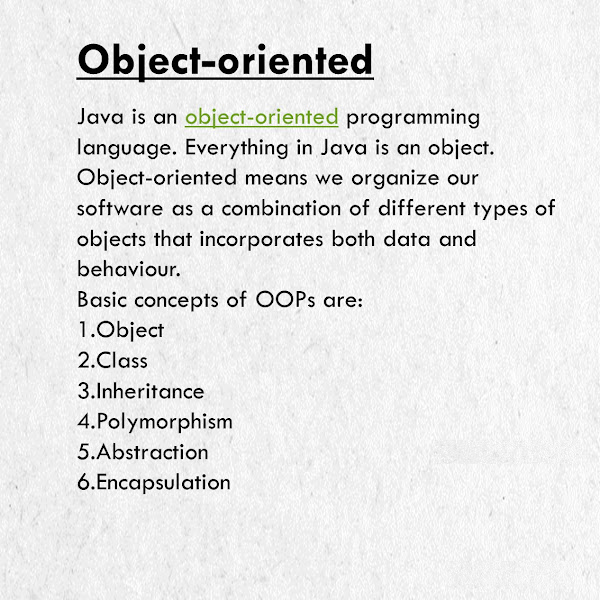Applications of Java
Applications of Java
Types of Java Application
There are so many types of applications that can
be created using Java programming, it gives lot of possibilities when it comes to create applications. In this
article we will delve into different types of Java applications, Providing you with valuable insights,
functionalities and their uses.
- Standalone Applications
- Web Applications
- Enterprise Applications
- Mobile Applications
- Scientific and Numerical Computing
- Financial Applications
- Internt of Things(IoT)
- Big Data Technologies
There are mainly 4 type of applications that can be created using java programming:
1.Standalone Applications:
Standalone Application is also known as desktop application or window-based application. An application that we need to install on local machine that runs without requiring internet connnection. These type of applications need Graphical user interface(GUI) for users to interact with and perform various tasks. So that Java is the best choice for them.These are the real-world examples for Standalone Applications
- Integrated Development Environments(IDE's) (Example: Intellij IDEA IDE)
- Media Players (Example: VLC Media Player)
- Image Editing softwares (Example: Paint.NET)
- Data base management tools (Example: Oracle)
- Scientific analysis tools (Example: MATLAB,SciLab)
- Point of sale(POS) System (Example: Generates the Bills/receipts at Malls/shops)
- Project management tools (Example: Microsoft Project,Trello)
- Financial Trading Platforms (Example: Trading simulators)
- Document Editors (Example: Apache Open Office)
2.Web Applications:
Web Applications that are accessed through the web browsers over the internet. They provide interactive and dynamic functionalities to the users amd typically rely on the client-server architecture. Java provides extensive ecosystem of libraries and frameworks.These are the real-world examples for Web Applications
- Java Sever Pages(JSP):
JSP is a technology that enables the creation of dynamic web pages using Java. It allows embedding Java code within HTML templates to generate dynamic content. - Java servlet:
Servlets are Java classes that handle incoming requests and generate responses on the server-side. It helps in user authentication System,and data manipulation Real time examples includes Online forms,and web-based email system. - Java Sever Faces(JSF):
JSF is a component-based framework for building web applications using Java. It simplifies the development process by providing reusable UI components and a model-view-controller (MVC) architecture. - Spring frameworks Applications:
The Spring framework is a popular Java framework for building web applications. It provides features for dependency injection, inversion of control, and aspect-oriented programming
3.Enterprise Applications:
An application that is distributed in nature,such as banking applications etc. It has the advantage of high level security, load balancing and clustering. In java, EJB is used for creating enterprise applications.These are the real-world examples for Enterprise Applications
- Banking and Financial Systems:
EJB is widely used in the development of banking applications, trading systems, and financial transaction processing systems that require robustness, scalability, and transactional integrity. - Telecom and Network Management Systems:
EJB is used in building network management systems, service provisioning platforms, and telecom billing systems that handle large volumes of data and require distributed processing capabilities. - Government Systems:
EJB is employed in the development of government applications such as e-government portals, tax management systems, and citizen services platforms that require secure and scalable architectures. - Healthcare Systems:
EJB is utilized in healthcare applications like hospital management systems, electronic health record systems, and telemedicine platforms, which handle sensitive patient data and require distributed processing.
4.Mobile Applications:
Mobile applications are designed to run on mobile devices such as smartphones and tablets. They are developed to offer various functionalities, services, and experiences to users on their mobile devices. Java is used for mobile application development, particularly for Android applications.These are the real-world examples for Mobile Applications
- Android Applications:
Android applications are built using Java and the Android SDK (Software Development Kit), which provides a wide range of tools, libraries, and APIs for building mobile apps.
Examples: Whatsapp,Instagram,Spotify,Uber,airbnb and Flipcart e.t.c - JavaFx for Mobile:
JavaFX is a framework for building rich, cross-platform applications, including mobile applications. With JavaFX, developers can create mobile applications that run on devices supporting Java ME (Micro Edition) or JavaFX Mobile platforms.
Examples:Logitech - Mobile Games:
Java is widely used for developing mobile games, ranging from simple 2D games to complex 3D games.
Examples:Angry birds,Temple run, and clash of clans e.t.c
Features of JAVA
There is given many features of java.They are also known as java buzzwords. The Java Features given below are simple and easy to understand.
About JAVA
Learn About JAVA and It's Origin
Java is an efficient powerful object-oriented
language developed in the year of '1991'.

Comments
Post a Comment